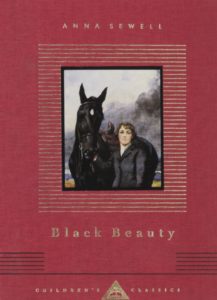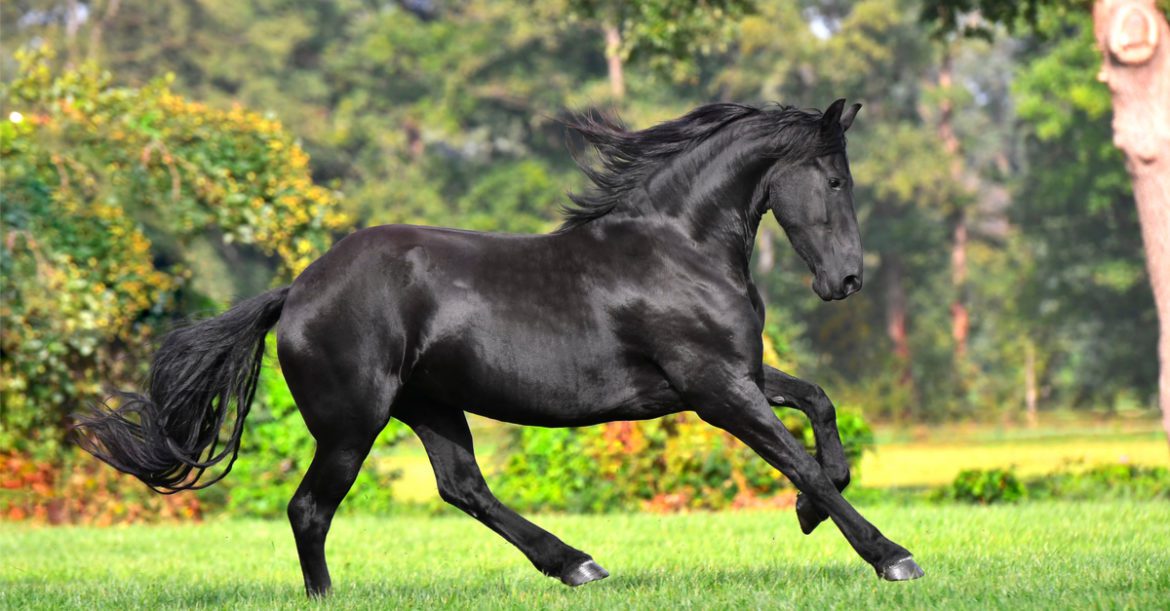“I wish you to pay attention to what I am going to say to you. You have been well-bred and well-born; your father has a great name in these parts, and your grandfather won the cup two years at the Newmarket races; your grandmother had the sweetest temper of any horse I ever knew, and I think you have never seen me kick or bite. I hope you will grow up gentle and good, and never learn bad ways, do your work with a good will, lift your feet up well when you trot, and never [bite] or kick even in play.”
“I have never forgotten my mother’s advice.”
—Beauty, from Anna Sewell’s novel,
BLACK BEAUTY: His Grooms and Companions, the Autobiography of a Horse
Black Beauty, by Anna Sewell, is the eponymous memoir of a handsome black horse with a white star on his forehead. He recounts his happy days as a carefree foal raised by a loving mare on a fine English farm owned by a kind and understanding squire. However, after he is four-years-old, Beauty suffers a series of upsets that lead him to a degrading life of hardship. After unfortunate twists and turns, the kindly hand of Fate steps in and Beauty is returned to the country, where he pleasantly lives out his days.
Universally considered the first important novel ever written in which the fictitious narrator’s “voice” is that of an animal, Black Beauty is not a children’s book, as often supposed. The author’s purpose, as Anna herself explained, was “to induce kindness, sympathy, and an understanding treatment of horses.” A deep and intense story of love and loyalty between humans and animals, Black Beauty was more than just a story: it opened the public’s eyes to the widespread mistreatment of horses. Virtually overnight, it set in motion a series of regulations and changes that put into lawful practice the humane treatment of all animals—agricultural, domestic, and wild.
 Black Beauty takes place in Anna’s own time, the early Victorian period in England. Before the combustion engine was invented, horses were England’s principle work animal, pulling all manner of wagons, carriages, and plows to cultivate the fields. Suffocating taxes and the expense of stabling left little for the city cab owners to feed a horse, let alone the cabbie and his family. Exhausted and starving, many horses were beaten within an inch of their lives just to get the job done. Maltreatment of horses was not restricted to the working class. “Bearing reins,” part of the tack used on the coach horses of the aristocracy, were used to pull up a horse’s head and unnaturally arch his neck in the fashion of the day. “It is too dreadful,” Beauty’s equine friend, Ginger, moaned, “your neck aching until you don’t know how to bear it…it hurts my tongue and my jaw and the blood from my tongue covered the froth that kept flying from my lips.”
Black Beauty takes place in Anna’s own time, the early Victorian period in England. Before the combustion engine was invented, horses were England’s principle work animal, pulling all manner of wagons, carriages, and plows to cultivate the fields. Suffocating taxes and the expense of stabling left little for the city cab owners to feed a horse, let alone the cabbie and his family. Exhausted and starving, many horses were beaten within an inch of their lives just to get the job done. Maltreatment of horses was not restricted to the working class. “Bearing reins,” part of the tack used on the coach horses of the aristocracy, were used to pull up a horse’s head and unnaturally arch his neck in the fashion of the day. “It is too dreadful,” Beauty’s equine friend, Ginger, moaned, “your neck aching until you don’t know how to bear it…it hurts my tongue and my jaw and the blood from my tongue covered the froth that kept flying from my lips.”
Anna’s novel is the amazing accomplishment of a women who relied and showered her affection on horses from childhood. At the age of 14, she fell and broke both ankles; crippled and unable to stand without crutches or walk for any length of time, she became adept at driving horse-drawn carriages, taking her father to his place of business and her mother to the many meetings she attended. Her life expanded even more when her only sibling, a younger brother, was left a widower with seven young children, and Anna and her parents relocated from Bath to be nearby to assist them. She lived out her days surrounded by those she loved, and who loved her…much the same as Black Beauty,. iIn the final lines, Anna wrote.
“My troubles are all over, and I am at home; and often before I am quite awake, I fancy I am still in the orchard at Bertwick, standing with my old friends under the apple-trees.”
In Black Beauty, Anna gives horses a voice and humans a reason to do better by their equine companions, and each other.

